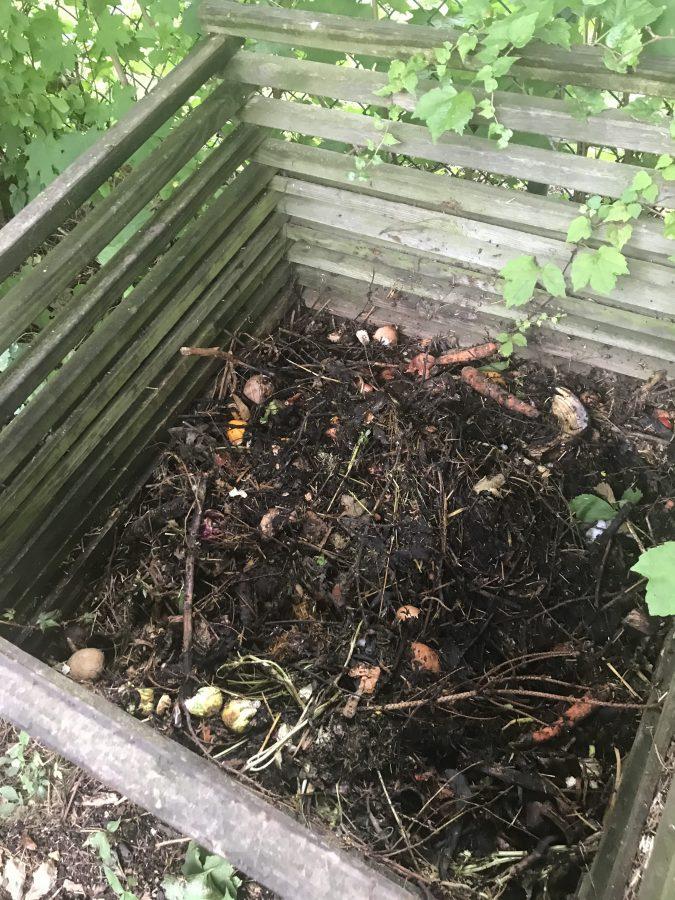Compost is organic material that can be added to soil to help plants grow. Food scraps, grass clippings, dead leaves – all of this, piled up in a heap and left
to decompose, will eventually form beautiful, nutri- ent-rich compost for your garden.
Why compost?
Food scraps and yard waste together currently make up more than 28% of what we throw away, taking up space in landfills and releasing greenhouse gases like methane. Composting keeps this organic material out of landfills, as well as:
- Enriches soil, helping retain moisture and sup- press plant diseases and pests.
- Reduces the need for chemical fertilizers.
- Encourages the production of beneficial bacteria and fungi that break down organic matter to cre- ate humus, a rich nutrient-filled material.
- Reduces methane emissions from landfills and lowers your carbon footprint.
- Provides your garden with free, renewable plant food year after year.
What can I compost? Food scraps (fruit and vegeta- ble peels, eggshells, coffee grounds and filters, tea bags, nut shells), yard waste (grass clippings, dead leaves, houseplants, hay and straw, wood chips), and other organic materials (cardboard, paper, sawdust from untreated wood, hair and fur, fireplace ashes).
To get the best compost, make sure you have an even mix of brown and green materials (or “dry” and “wet”). Brown/dry materials include dead leaves, branches, and twigs. Green/wet materials include grass clippings, food scraps, and coffee grounds. As you build your compost pile, alternate layers of brown and green materials.
What not to compost
Dairy products, cooked food, fats, grease, lard, or oils, meat, fish, bones, pet wastes, coal or charcoal ash, yard waste treated with chemicals, black walnut tree leaves or twigs. Cooked leftovers, meat, fish, and bones will attract unwanted animals – and create unwanted smells! Leave them out!
Home vs. Municipal Composting
Some towns and cities have curbside organics programs, ad will pick up (or accept drop-offs of) food scraps and other organic material (including meat, dairy, and other things not suitable for home composting). Peekskill does not have a curbside organics program – not yet! If you’d like one, tell your elected representatives.
The Process
Save your compostable food scraps in a simple plastic container you can keep on your kitchen counter, or under the sink.
As the container fills up, empty the scraps into a compost tumbler or directly into a rot-resistant compost bin. Keep moist and turn occasionally to promote air circulation. Add yard waste.
In the spring (after about 1 year), sift the finished compost and set aside for use in your garden. Anything that hasn’t fully decomposed (large sticks, avocado pits, etc.) gets thrown back into the pile for another year.
To get the best compost, make sure you have an even mix of brown and green materials (or “dry” and “wet”). Brown/dry materials include dead leaves, branches, and twigs. Green/wet materials include grass clippings, food scraps, and coffee grounds. As you build your compost pile, alternate layers of brown and green materials.
What not to compost
Dairy products, cooked food, fats, grease, lard, or oils, meat, fish, bones, pet wastes, coal or charcoal ash, yard waste treated with chemicals, black walnut tree leaves or twigs. Cooked leftovers, meat, fish, and bones will attract unwanted animals – and create unwanted smells! Leave them out!
Home vs. Municipal Composting
Some towns and cities have curbside organics programs, ad will pick up (or accept drop-offs of) food scraps and other organic material (including meat, dairy, and other things not suitable for home composting). Peekskill does not have a curbside organics program – not yet! If you’d like one, tell your elected representatives.
The Process
Save your compostable food scraps in a simple plastic container you can keep on your kitchen counter, or under the sink.
As the container fills up, empty the scraps into a compost tumbler or directly into a rot-resistant compost bin. Keep moist and turn occasionally to promote air circulation. Add yard waste.
In the spring (after about 1 year), sift the finished compost and set aside for use in your garden. Anything that hasn’t fully decomposed (large sticks, avocado pits, etc.) gets thrown back into the pile for another year.
Bin Types
Tumbling Style Backyard Bin
Backyard Bin in Wood or Plastic



